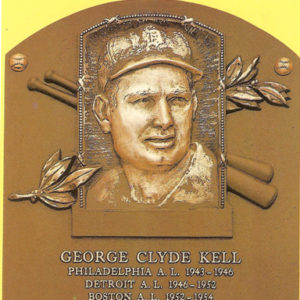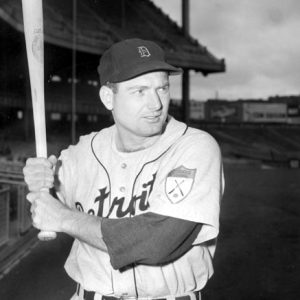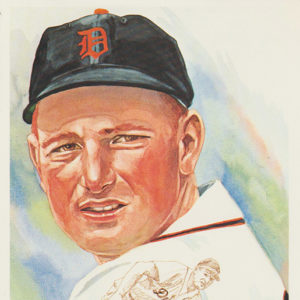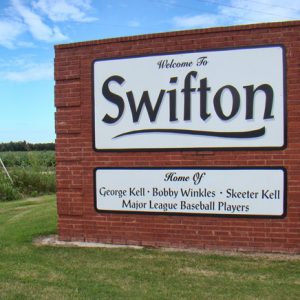calsfoundation@cals.org
George Clyde Kell (1922–2009)
George Clyde Kell was a professional baseball player, announcer, and businessman and is a member of the Arkansas Sports Hall of Fame and the National Baseball Hall of Fame. A lifelong resident of the small Arkansas town in which he was born, Kell also served for ten years as a member of the state’s Highway Commission and was campaign chairman for Dale Bumpers in the 1970 gubernatorial race.
George Kell was born August 23, 1922, in Swifton (Jackson County) to Clyde and Alma Kell. His father, a barber, was a pitcher on the local semiprofessional baseball team, and Kell and his two younger brothers grew up playing the game. After high school, Kell began studying at Arkansas State College (now Arkansas State University) in Jonesboro (Craighead County) but did not return for his second year.
Kell was offered his first professional baseball contract in 1940 by Newport (Jackson County), a low minor-league affiliate of the Brooklyn Dodgers that played in the Northeast Arkansas League. On March 24, 1941, he married Charlene Felts, with whom he would have two children, and returned to Newport to play another season. After Brooklyn’s minor league system released him, he played for a minor league affiliate of the Philadelphia Athletics for the next two seasons, leading all minor leaguers in hitting in 1943 with a .396 average.
In 1944, with many established major league players serving in the military in World War II, Kell became the starting third baseman for Philadelphia (he was rejected from the military draft because of a surgically repaired knee). Though a good fielder, Kell was only an average hitter in Philadelphia. Philadelphia Manager Connie Mack suggested that Kell switch to a lighter bat and concentrate on hitting line drives to all parts of the field rather than trying to pull pitches for power. The fruits of this approach began to show in the 1946 season, but early that year, Kell was traded to the Detroit Tigers.
In Detroit, Kell became a star. He hit .322 in 1946 and kept his batting average over .300 for the next seven seasons. He led the league in fielding percentage for third basemen seven times in his career. He played in six All-Star Games between 1947 and 1957. In 1949, Kell led the American League in hitting with a .343 average, finishing ahead of Boston’s Ted Williams by only thousandths of a point in one of the closest contests in baseball history.
Kell was traded three more times: in 1952 to the Boston Red Sox, in 1954 to the Chicago White Sox, and in 1956 to the Baltimore Orioles. In Baltimore, Kell helped tutor Brooks Robinson, another third baseman from Arkansas who was just entering the major leagues and who would later go into the National Baseball Hall of Fame the same year as Kell. After the 1957 season, Kell decided to spend more time with his family and retired, despite Baltimore’s efforts to persuade him to keep playing.
Before the 1958 season, the CBS television network hired Kell to join its Game of the Week broadcast, which also featured fellow Arkansan Jay Hanna“Dizzy” Dean. In 1959, Kell moved from CBS to the broadcasting team of the Detroit Tigers. He became the voice of Detroit Tiger television broadcasts, leaving his home in Swifton to announce about forty-five games a year until he retired from broadcasting in 1997.
While he was playing baseball, Kell had bought farmland in Swifton. He went home to work it in the off-seasons and continued farming after he retired from playing. Kell’s other interests included a car dealership in Newport that he bought into in 1962. He later became the sole owner of Kell Motor Company and ran the business until selling it to his son in 1994.
His involvement in Bumpers’s 1970 campaign came about when Bumpers spoke to businessmen in Newport before the primaries to raise support. Kell was impressed by the little-known Bumpers and took an active role in his campaign. After Bumpers was elected, he appointed Kell to the state Highway Commission, which Kell later chaired for four years.
Though the Baseball Writers Association of America did not elect him to the National Baseball Hall of Fame, he was elected in 1983 by the Veterans Committee, a panel set up to reexamine candidates after their eligibility for inclusion by the writers association expired. He had previously been inducted into the Arkansas Sports Hall of Fame (1964) and was later inducted into the Arkansas State University Hall of Honor (1999).
Kell’s wife Charlene died in 1991, and Kell later married Carolyn Peters Clark. With the assistance of Dan Ewald, he published his memoir, Hello Everybody, I’m George Kell, in 1998. In October 2001, his house caught fire, destroying most of his baseball memorabilia, but he rebuilt in the same location. He was involved in a traffic accident in 2004 and needed several months to recover from his injuries.
Kell died on March 24, 2009, at his home in Swifton. He is interred in Swifton Cemetery. In 2010, the United States Senate passed a bill to rename the Swifton post office after Kell.
For additional information:
Bak, Richard. Cobb Would Have Caught It: The Golden Age of Baseball in Detroit. Detroit, MI: Wayne State University Press, 1991.
Craig, Robert D. “George Kell, Baseball Hall of Famer.” Stream of History 54 (2021): 17–48.
Kell, George. “My Major League Baseball Career.” Craighead County Historical Journal 47 (April 2009): 3-6.
Kell, George, and Dan Ewald. Hello Everybody, I’m George Kell. Champaign, IL: Sports Publishing, 1998.
Schneider, Russell. “George Kell: From Rejected Prospect to Hall of Famer.” Baseball Digest 53 (August 1994): 63–66.
Trimble, Mike. “Playing Days Are Over, But Life Still Has Luster.” Arkansas Gazette. August 15, 1982, p. 1A.
Leland Razer
Central Arkansas Library System
 George Kell Baseball Hall of Fame Plaque
George Kell Baseball Hall of Fame Plaque  George Kell
George Kell  George Kell
George Kell  Swifton Sign
Swifton Sign 




Comments
No comments on this entry yet.